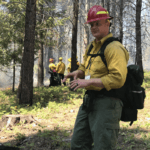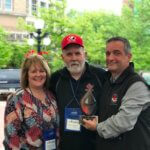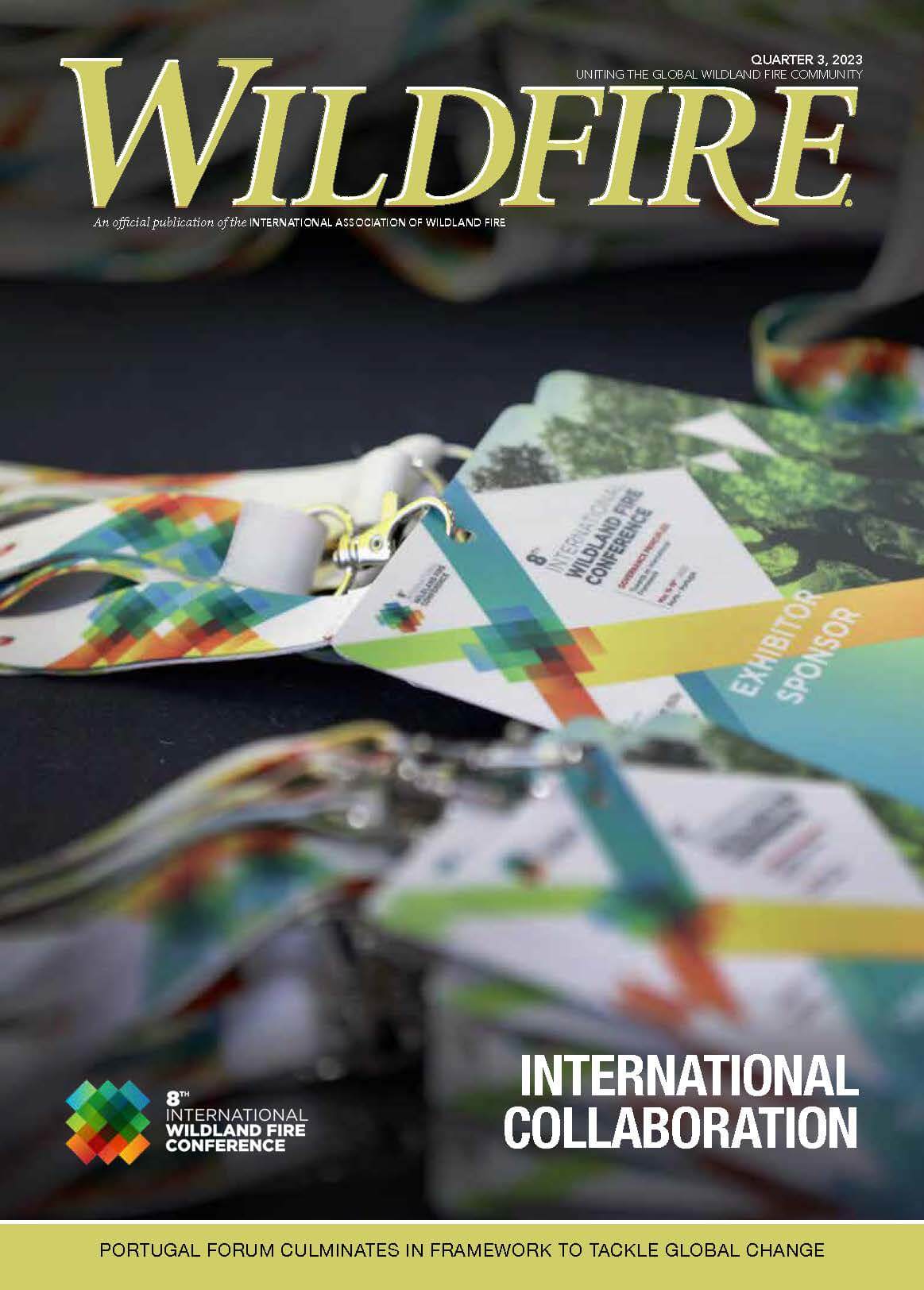The 2018 IAWF Early Career Award in Fire Operations and the Firebreak Award for Excellence in Fire Management will be announced and presented at one of our upcoming conferences.
+
Early Career Award for Dr. Nicholas Skowronski
The 2018 recipient of the IAWF Early Career Award in Fire Science is Dr. Nicholas Skowronski. Nick is a research forester with the Northern Research Station, US Forest Service. His award was presented by Alen Slijepcevic, IAWF President, at the Fire Continuum Conference in Missoula.
The Early Career in Fire Science award is to recognize a promising early-career professional who has demonstrated outstanding ability in the field of wildland fire science. “Early career” is nominally taken to include professionals who are within ten years of having earned their highest degree or are under 40 years of age when nominated.

Nick’s current research focuses on the quantification and analysis of the structural characteristics of forest canopies and how this relates to carbon and water cycles. He has recently been using a newly emerging remote sensing technology called LiDAR which actively characterizes the canopy with a laser beam. His work is split between developing methods for using LiDAR and other remotes sensing techniques for wildfire mitigation and studying how forest functionality changes after disturbance.
A few comments from the folks who nominated Nick:
“Dr. Skowronski has a proven capacity to involve people beyond the realm of wildfire research and encompasses the spirit of true inclusivity and collaboration. He has great experience in the field conducting prescribed fire research and is also the successful founder and lead scientist of the North Atlantic Fire Science Exchange.”
“Dr. Skowronski has a solid record of published and impactful research. He continues to make important contributions concerning the application of remote sensing and LiDAR to wildfire management. Dr. Skowronski appears to interact with a variety of managers, academics, and practitioners–he serves as a bridge between knowledge development and practice. He also serves as the PI for the North Atlantic Fire Science Consortium, which demonstrates a commitment to outreach.”
“Nicholas Skowronski has a strong authorship to merit his nomination of this award. The versatility of his work indicate that he has strong cross-disciplinary skills that are greatly underrepresented and greatly needed in the world of wildfire research. Additionally, his experience “walking the walk” elevates his qualifications to receive this award, as all wildfire science should seek to answer questions and improve our on-the-ground understanding of wildfire.
Congratulations, Nicholas.
+
Marty Alexander receives Ember Award
The 2018 recipient of the IAWF Ember Award for Excellence in Wildland Fire Science is Dr. Marty Alexander. His award was presented by Alen Slijepcevic, IAWF President, at the Fire Continuum Conference in Missoula.
The purpose of the “Ember Award” is to recognize sustained excellence in wildland fire research and to encourage innovation, exploration, application, and dissemination of important research results. The name “Ember” reflects the fact that research and science often move slowly, and their benefits or impacts may not be apparent for years. The award was established to recognize sustained and excellent research contributions to wildland fire science, innovative solutions to important wildland fire challenges, and effective and appropriate communication of wildland fire science and research results. The first Ember Award was presented in 2006 with eight total recipients to date.

Dr. Alexander has had an exceptional 40 year record creating knowledge, packaging and disseminating it to the global wildland fire community. He has continually elevated his professional standing to the point where he is now recognized as the premier expert on many aspects of wildland fire. He has collaborated with colleagues across North America, Europe, the Near East, and ‘down under’ to develop innovative solutions to crucial wildland fire challenges. With more than 350 publications to his credit, including 61 peer-reviewed articles. According to Google Scholar Citations, his publications have been cited 5,634 times.
His effectiveness as a communicator is further attested to by the roughly 150 invited speeches/lectures given and his interview record with media giants including BBC, CBC, and Discovery Channel Canada. Marty ‘s sustained research excellence and magnitude of their global impacts are affirmed by the dozen+ major awards he has received, including the Canadian Forestry Achievement Award and the coveted James G. Wright Award for career achievement in forest fire research. He was identified in ‘Forest Fires: A Reference Handbook’ as one of 23 individuals that have influenced wildland fire policy and knowledge globally. Marty is smart, intellectually honest, professionally passionate and holds everyone to the same high standards.
Marty has had an outstanding career, with just a few of this accomplishments listed below.
- He is one of four architects of the Canadian Forest Fire Behavior Prediction (FBP) System.
- Co-authored the FBP ‘Red Book’ field guide which has been copied internationally.
- He co-developed the new generation of practical-oriented models and system software for predicting crown fire initiation and spread as well as other aspects of extreme fire behavior.
- He has authored seminal publications on fireline intensity and crown fire behavior exemplified by three chapters on fire behaviour in the 2014 book ‘Fire on Earth: An Introduction’, and the co-authored 2015 book ‘A Guide to Rate of Fire Spread Models for Australian Vegetation’.
- He co-authored a prescribed burning fuels and fire behavior documentation manual that has been emulated by organizations worldwide.
- Popularized the wildfire behavior case-study concept within Canada and elsewhere.
- Conceived the concept of the Canadian Forest Fire Danger Rating System Users’ Guide which has been extensively replicated.
- Helped develop fire management applications and interpretive aids nationally and globally.
- Initiated and coordinated a series of fire weather seminars designed to enhance information and technology transfer of fire research results.
- Developed a classification system to describe and communicate fire behavior information used globally by fire managers, fire behavior analysts (FBAN’s), and fire scientists.
- Co-founded the two Canadian Interagency Forest Fire Centre fire behavior training courses – Advanced Wildland Fire Behavior and Wildland Fire Behavior Specialist – and has trained several generations of fire operations staff and FBANs.
- A key member in developing Canadian CD-ROM based training courses for fire behavior, firefighter safety, and fire danger rating.
Congratulations Marty on this well-deserved award.
+
A Thank You Note from the 2018 Ember Award Recipient
I’m deeply humbled to have received the Ember Award for there are many deserving folks out there. It is indeed a very great honor to receive this award and to be included in the list of previous award recipients, all of whom I view as either wildland fire science icons and/or as personal mentors.
Space does not permit me to acknowledge all the many individuals who have in one way or another contributed to my receiving the Ember Award. However, I would like to acknowledge the following:
- First and foremost is my wife Heather (of 43 years) who kept the home fires burning raising four children while I was away in the field or out of town on other business. Her support over the years has certainly made this all possible.
- Wally Lancaster, Jack Barrows, Jack Dieterich, Jim Davis, Bill Furman, Mike Fosberg, John Deeming and Dave Sandberg for their support and encouragement very early on in my fire research career.
- Brian Stocks and the late Dennis Dube who have been long-serving mentors. Others from the Canadian Forest Service fire research group include Bruce Lawson, Charlie Van Wagner, Rob McAlpine, Bill de Groot, Kelvin Hirsch, Steve Taylor, Mike Wotton, Tim Lynham, Doug McRae, Brad Hawkes, Mike Weber, Mike Flannigan, Murray Maffey, John Mason, Gary Hartley, Jack Bell and George Dalrymple.
- Phil Cheney and Miguel Cruz with Commonwealth Scientific and Industrial Research Organization of Australia, Chris Trevitt with the Australian National University, Grant Pearce with the Scion Rural Fire Research of New Zealand, and Murray Dudfield with the National Rural Fire Authority of New Zealand.
- To many members of the operational fire management community in Canada for their support over the years, namely Rick Lanoville (Northwest Territories), Terry Van Nest, Dennis Quintilio, Rob Thorburn, Howard Herman and Dave Finn (Alberta), Al Beaver and Kris Johnson (Yukon Territory), Dana Hicks and Judi Beck (British Columbia), and Bill Droog (Ontario) as well as Dave Thomas (U.S. Forest Service) and Frank Cole (Alaska).
- To several members of academia, including Peter Murphy (U of Alberta), Brigitte Leblon (U of New Brunswick) and Mike Jenkins (Utah State U) as well as many graduate students but especially Nathalie Lavoie, Steve Otway and Wesley Page.
- Special thanks to Dale Wade for nominating me and to the award selection committee for considering me as deserving of the award.
There are many others who have contributed, challenged and enriched my work in wildland fire science. To you all I am most grateful.
Sincerely, Marty Alexander
